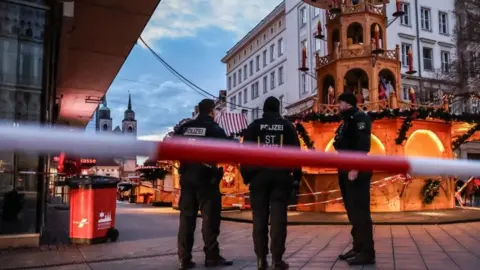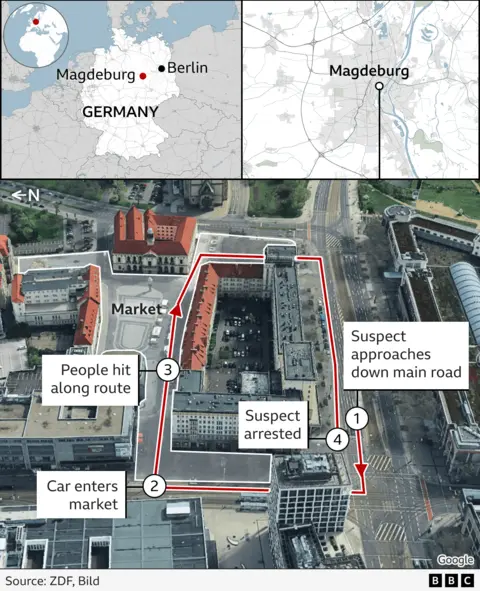German police probe market attack security and warnings
 EPA
EPAGerman authorities are facing questions about security and what they knew about the suspect accused of using an access lane for emergency vehicles to drive into a Christmas market in Magdeburg, killing five people and injuring more than 200.
On a visit on Saturday, politicians were heckled by members of the public, some seemingly outraged by what was criticised as a security lapse.
German authorities have defended the market's layout and security.
Authorities are also fielding questions after reports they were warned last year about the suspect, with police saying they had evaluated whether the suspect might be a threat a year ago.
The suspect has been ordered into pre-trial detention on counts of murder, attempted murder and dangerous bodily harm.
- Tributes paid to nine-year-old killed in market attack
- Grief and anger in Magdeburg after Christmas market attack
- Explained: What we know so far about Magdeburg Christmas market attack
- From the scene: Eyewitness heard rumbling and shattering glass
Usually at this time of the year, German city centres are full of shoppers and revellers drinking mulled wine, but this year the mood is very different.
The main Christmas market is cordoned off by tape and surrounded by police vans as armed officers patrol the shops and malls nearby.
There is sadness in the air in Magdeburg, as well as bafflement and anger, as people ask how could this have happened.
As politicians walked out of the cordoned-off market during their visit on Saturday, they were met with booing and heckling and shouts of "hau ab", an extremely aggressive form of "get lost".
Some people seemed enraged by a perceived lapse in security. Others appeared simply annoyed and irritated in general at Germany's political leaders.
Security has ramped up at Christmas markets across Germany since a similar attack in Berlin in 2016 when a man drove a lorry into a market crowd, killing 12 people.
Open-plan Christmas markets now have some sort of barrier around them — typically large concrete blocks, which is the case in Magdeburg.
However, the gap in the barriers was large enough to allow emergency vehicles to pass through.
City official Ronni Krug told reporters at a press conference on Saturday that emergency responders needed an evacuation route in case of a "conventional" emergency, and all the relevant agencies approved the plan.
"A safety and security concept must, on the one hand, protect those visiting an event as much as possible, but also needs to ensure, at the same time, if something does happen, they are able to leave the site safely and rapidly", he said.
"Perhaps it is something that could not have been prevented", he added.
German media reported that before the attack, there had been warnings into a potential threat from the suspect.
The suspect, a doctor from Saudi Arabia named Taleb al-Abdulmohsen, arrived in Germany in 2006 and in 2016 was recognised as a refugee.
An atheist, he ran a website that aimed to help other former Muslims flee persecution in their Gulf homelands. His social media was full of anti-Islamic sentiment and conspiracy theories.
At Saturday's press conference, Magdeburg police chief Tom-Oliver Langhans said police had conducted an evaluation as to whether the suspect might be a potential threat, "but that discussion was one year ago".
He added that investigations into the suspect's past were ongoing and declined to comment further.
Federal Minister of the Interior Nancy Faeser told German newspaper Bild that investigators would examine "in detail" what information authorities had on the suspect in the past and how he had been investigated.
The German Office for Migration and Refugees announced in a post on social media that it had fielded a complaint about the suspect, which it had "taken seriously", but as the office is not an investigative body, had referred the complainant to other authorities.
One tip-off received by authorities is believed to have come from Saudi Arabia, the suspect's home country.
A source close to the Saudi government told the BBC it sent four official notifications known as "Notes Verbal" to German authorities, warning them about what they said were "the very extreme views" held by al-Abdulmohsen.
However, a counter-terrorism expert told the BBC the Saudis may have been mounting a disinformation campaign to discredit someone who tried to help young Saudi women seek asylum in Germany.
On Saturday, Langhans said he did not have information when asked about Saudi Arabia issuing warnings.
Later, the head of the Federal Criminal Police Office (BKA), Holger Münch, told public broadcaster ZDF that his office had received a notice from Saudi Arabia in November 2023. He said local police took appropriate investigative measures, but the matter was unspecific.
He added that the suspect "had various contacts with authorities, insulted them and even made threats, but he was not known for violent acts".
Past investigations would need to be revisited, Münch said.
Social media under scrutiny
The social media accounts of the suspect are under a great deal scrutiny as investigators build their case against him.
He was a prolific poster of anti-Islamic sentiment and conspiracy theories on X, and had made threats in the past.
The German ambassador to the UK said X owner Elon Musk had questions to answer about why his platform had not taken action against al-Abdulmohsen.
"We have seen that the man who committed this terrible attack was extremely active, threatening on X. The question is, 'does X really act against these things?'," Ambassador Miguel Berger told BBC Radio 4's Broadcasting House programme on Sunday.
"We have a Digital Safety Act in the European Union which requires social media to act [...]. It has not happened," he said.
Musk's own account called for Scholz to resign, and retweeted several accounts broadly criticising the German government for failing to act on threats made on social media by the suspect.
The BBC has contacted X for a response.
Musk's criticism of German authorities goes beyond the Magdeburg attack. In the morning before the attack, he posted in support of far-right political party Alternative for Germany (AfD).
"Only the AfD can save Germany," he said.
Leader of the party, Alice Weidel, thanked Musk for his "note" and said "the Alternative for Germany is indeed the one and only alternative for our country; our very last option," in a post retweeted by Musk.
When asked by the BBC to comment on Musk telling Germans how to vote, Berger said: "I think Elon Musk - before giving unwanted advice to German citizens - he should look at the responsibility of his own platform".

